Political & Economic Reasons for Uneven IFRS & Impact on Investors
VerifiedAdded on 2023/06/12
|5
|959
|331
Essay
AI Summary
This essay explores the political and economic reasons behind the uneven implementation of International Financial Reporting Standards (IFRS) globally and its potential effects on investors. It highlights that despite increased globalization, local political and economic factors significantly influence financial reporting practices. The essay argues that uniform IFRS implementation is challenging due to differing incentives for enforcers and preparers, as well as the flexibility within IFRS that allows for variations based on local contexts. Weak enforcement mechanisms further contribute to the uneven application of standards, leading to increased information costs and risks for investors, especially those investing internationally. While uniform standards could mitigate these challenges, the essay cautions against overlooking inherent differences in financial report quality across nations.
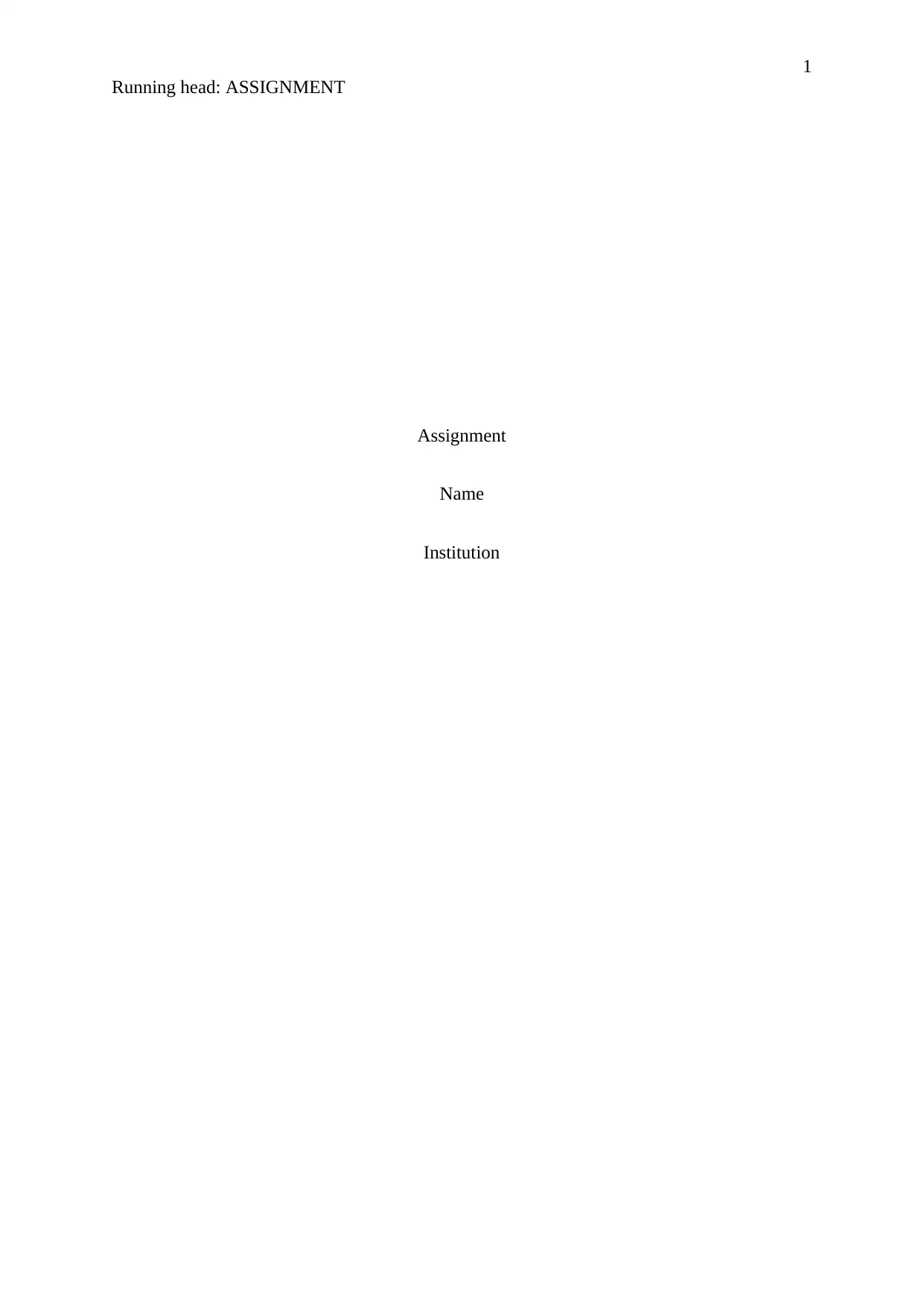
1
Running head: ASSIGNMENT
Assignment
Name
Institution
Running head: ASSIGNMENT
Assignment
Name
Institution
Paraphrase This Document
Need a fresh take? Get an instant paraphrase of this document with our AI Paraphraser
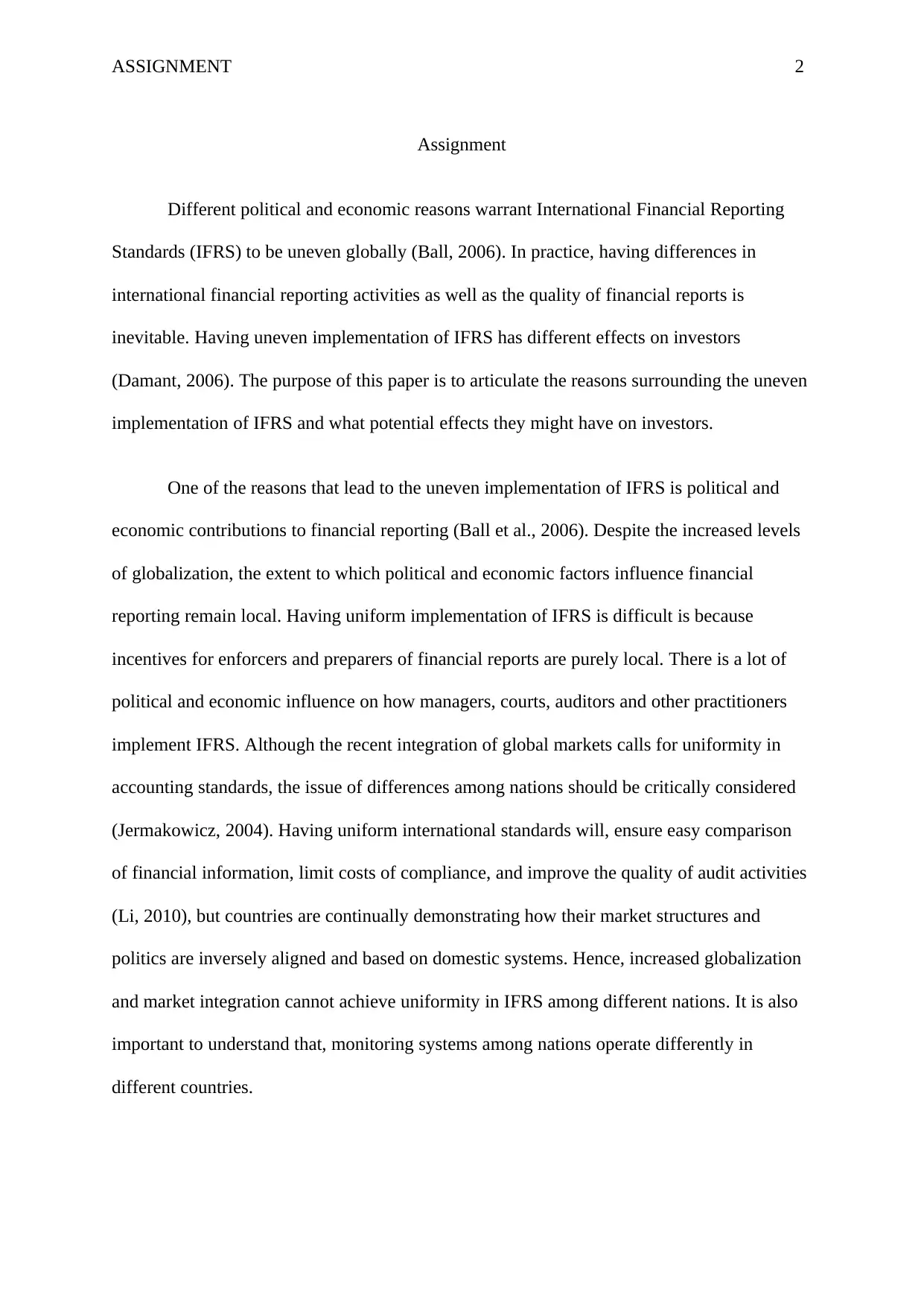
ASSIGNMENT 2
Assignment
Different political and economic reasons warrant International Financial Reporting
Standards (IFRS) to be uneven globally (Ball, 2006). In practice, having differences in
international financial reporting activities as well as the quality of financial reports is
inevitable. Having uneven implementation of IFRS has different effects on investors
(Damant, 2006). The purpose of this paper is to articulate the reasons surrounding the uneven
implementation of IFRS and what potential effects they might have on investors.
One of the reasons that lead to the uneven implementation of IFRS is political and
economic contributions to financial reporting (Ball et al., 2006). Despite the increased levels
of globalization, the extent to which political and economic factors influence financial
reporting remain local. Having uniform implementation of IFRS is difficult is because
incentives for enforcers and preparers of financial reports are purely local. There is a lot of
political and economic influence on how managers, courts, auditors and other practitioners
implement IFRS. Although the recent integration of global markets calls for uniformity in
accounting standards, the issue of differences among nations should be critically considered
(Jermakowicz, 2004). Having uniform international standards will, ensure easy comparison
of financial information, limit costs of compliance, and improve the quality of audit activities
(Li, 2010), but countries are continually demonstrating how their market structures and
politics are inversely aligned and based on domestic systems. Hence, increased globalization
and market integration cannot achieve uniformity in IFRS among different nations. It is also
important to understand that, monitoring systems among nations operate differently in
different countries.
Assignment
Different political and economic reasons warrant International Financial Reporting
Standards (IFRS) to be uneven globally (Ball, 2006). In practice, having differences in
international financial reporting activities as well as the quality of financial reports is
inevitable. Having uneven implementation of IFRS has different effects on investors
(Damant, 2006). The purpose of this paper is to articulate the reasons surrounding the uneven
implementation of IFRS and what potential effects they might have on investors.
One of the reasons that lead to the uneven implementation of IFRS is political and
economic contributions to financial reporting (Ball et al., 2006). Despite the increased levels
of globalization, the extent to which political and economic factors influence financial
reporting remain local. Having uniform implementation of IFRS is difficult is because
incentives for enforcers and preparers of financial reports are purely local. There is a lot of
political and economic influence on how managers, courts, auditors and other practitioners
implement IFRS. Although the recent integration of global markets calls for uniformity in
accounting standards, the issue of differences among nations should be critically considered
(Jermakowicz, 2004). Having uniform international standards will, ensure easy comparison
of financial information, limit costs of compliance, and improve the quality of audit activities
(Li, 2010), but countries are continually demonstrating how their market structures and
politics are inversely aligned and based on domestic systems. Hence, increased globalization
and market integration cannot achieve uniformity in IFRS among different nations. It is also
important to understand that, monitoring systems among nations operate differently in
different countries.
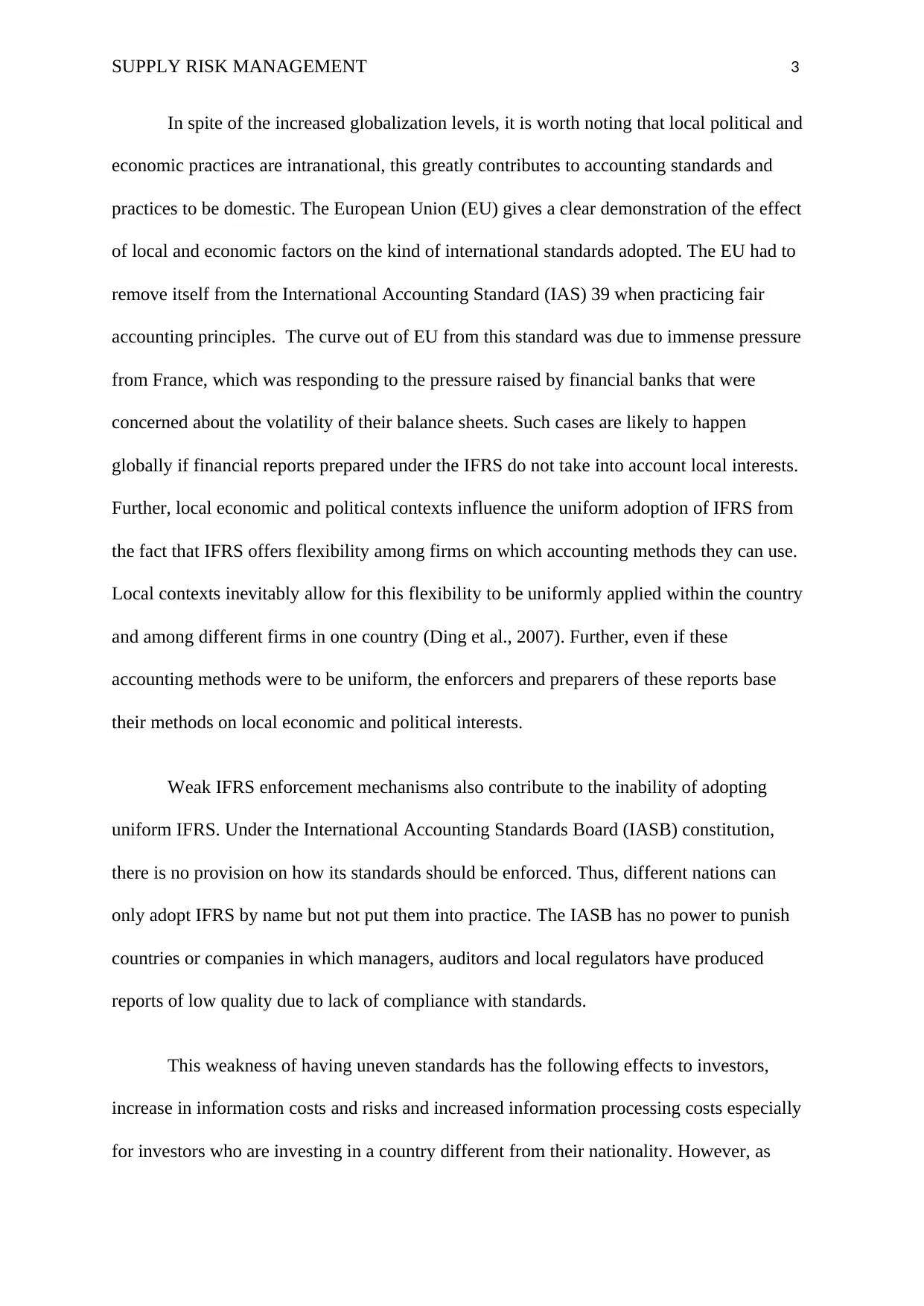
SUPPLY RISK MANAGEMENT 3
In spite of the increased globalization levels, it is worth noting that local political and
economic practices are intranational, this greatly contributes to accounting standards and
practices to be domestic. The European Union (EU) gives a clear demonstration of the effect
of local and economic factors on the kind of international standards adopted. The EU had to
remove itself from the International Accounting Standard (IAS) 39 when practicing fair
accounting principles. The curve out of EU from this standard was due to immense pressure
from France, which was responding to the pressure raised by financial banks that were
concerned about the volatility of their balance sheets. Such cases are likely to happen
globally if financial reports prepared under the IFRS do not take into account local interests.
Further, local economic and political contexts influence the uniform adoption of IFRS from
the fact that IFRS offers flexibility among firms on which accounting methods they can use.
Local contexts inevitably allow for this flexibility to be uniformly applied within the country
and among different firms in one country (Ding et al., 2007). Further, even if these
accounting methods were to be uniform, the enforcers and preparers of these reports base
their methods on local economic and political interests.
Weak IFRS enforcement mechanisms also contribute to the inability of adopting
uniform IFRS. Under the International Accounting Standards Board (IASB) constitution,
there is no provision on how its standards should be enforced. Thus, different nations can
only adopt IFRS by name but not put them into practice. The IASB has no power to punish
countries or companies in which managers, auditors and local regulators have produced
reports of low quality due to lack of compliance with standards.
This weakness of having uneven standards has the following effects to investors,
increase in information costs and risks and increased information processing costs especially
for investors who are investing in a country different from their nationality. However, as
In spite of the increased globalization levels, it is worth noting that local political and
economic practices are intranational, this greatly contributes to accounting standards and
practices to be domestic. The European Union (EU) gives a clear demonstration of the effect
of local and economic factors on the kind of international standards adopted. The EU had to
remove itself from the International Accounting Standard (IAS) 39 when practicing fair
accounting principles. The curve out of EU from this standard was due to immense pressure
from France, which was responding to the pressure raised by financial banks that were
concerned about the volatility of their balance sheets. Such cases are likely to happen
globally if financial reports prepared under the IFRS do not take into account local interests.
Further, local economic and political contexts influence the uniform adoption of IFRS from
the fact that IFRS offers flexibility among firms on which accounting methods they can use.
Local contexts inevitably allow for this flexibility to be uniformly applied within the country
and among different firms in one country (Ding et al., 2007). Further, even if these
accounting methods were to be uniform, the enforcers and preparers of these reports base
their methods on local economic and political interests.
Weak IFRS enforcement mechanisms also contribute to the inability of adopting
uniform IFRS. Under the International Accounting Standards Board (IASB) constitution,
there is no provision on how its standards should be enforced. Thus, different nations can
only adopt IFRS by name but not put them into practice. The IASB has no power to punish
countries or companies in which managers, auditors and local regulators have produced
reports of low quality due to lack of compliance with standards.
This weakness of having uneven standards has the following effects to investors,
increase in information costs and risks and increased information processing costs especially
for investors who are investing in a country different from their nationality. However, as
⊘ This is a preview!⊘
Do you want full access?
Subscribe today to unlock all pages.

Trusted by 1+ million students worldwide
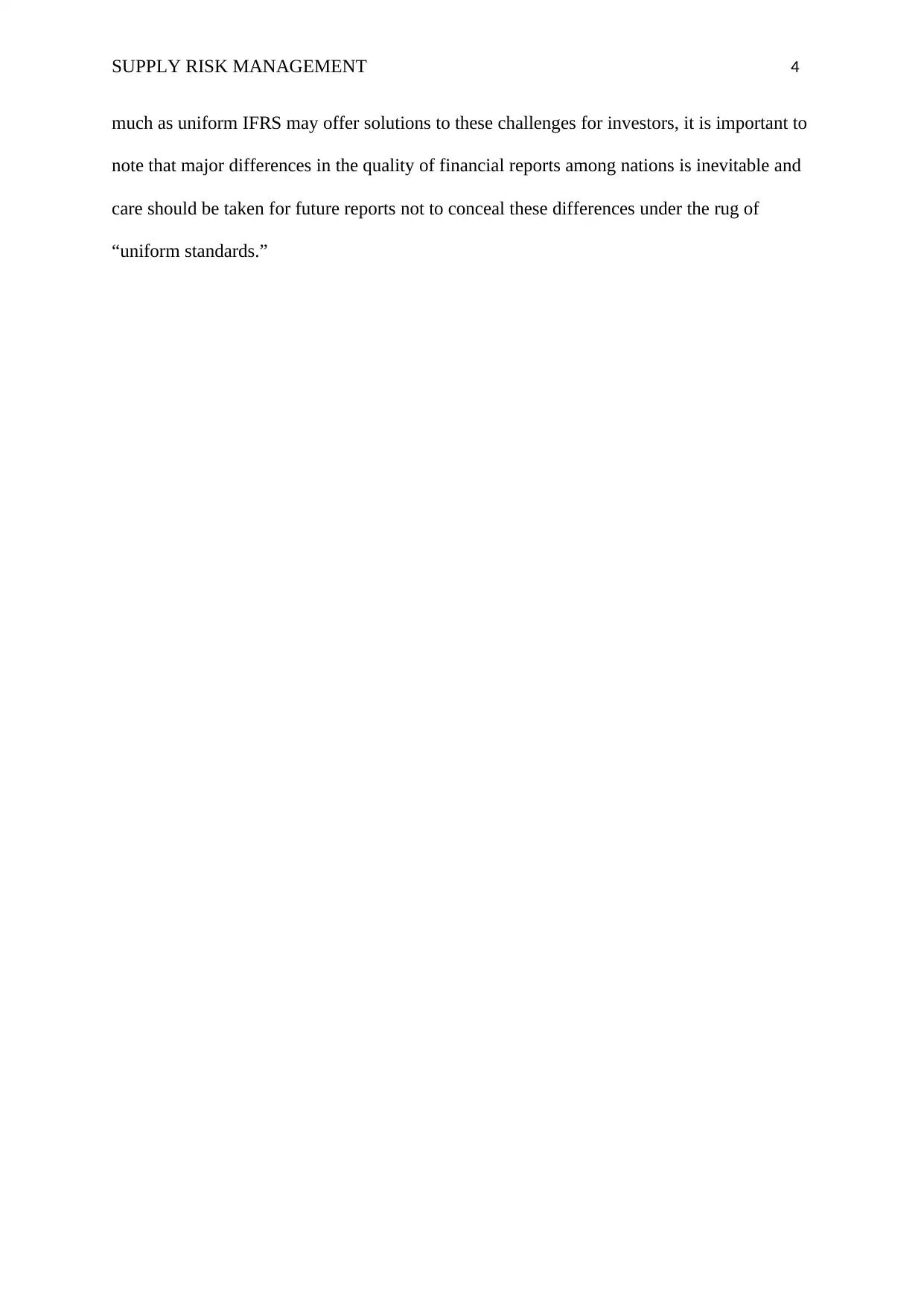
SUPPLY RISK MANAGEMENT 4
much as uniform IFRS may offer solutions to these challenges for investors, it is important to
note that major differences in the quality of financial reports among nations is inevitable and
care should be taken for future reports not to conceal these differences under the rug of
“uniform standards.”
much as uniform IFRS may offer solutions to these challenges for investors, it is important to
note that major differences in the quality of financial reports among nations is inevitable and
care should be taken for future reports not to conceal these differences under the rug of
“uniform standards.”
Paraphrase This Document
Need a fresh take? Get an instant paraphrase of this document with our AI Paraphraser
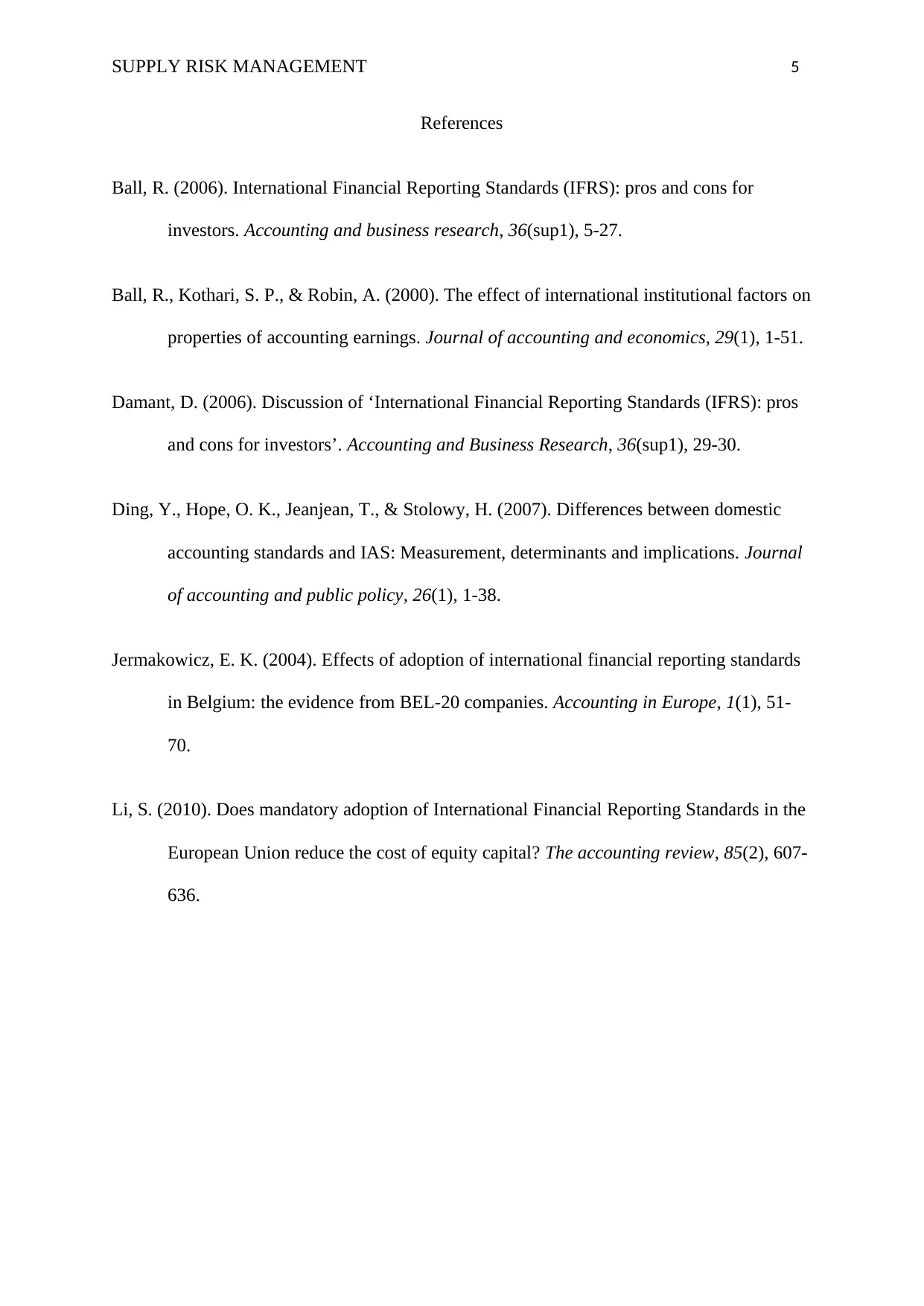
SUPPLY RISK MANAGEMENT 5
References
Ball, R. (2006). International Financial Reporting Standards (IFRS): pros and cons for
investors. Accounting and business research, 36(sup1), 5-27.
Ball, R., Kothari, S. P., & Robin, A. (2000). The effect of international institutional factors on
properties of accounting earnings. Journal of accounting and economics, 29(1), 1-51.
Damant, D. (2006). Discussion of ‘International Financial Reporting Standards (IFRS): pros
and cons for investors’. Accounting and Business Research, 36(sup1), 29-30.
Ding, Y., Hope, O. K., Jeanjean, T., & Stolowy, H. (2007). Differences between domestic
accounting standards and IAS: Measurement, determinants and implications. Journal
of accounting and public policy, 26(1), 1-38.
Jermakowicz, E. K. (2004). Effects of adoption of international financial reporting standards
in Belgium: the evidence from BEL-20 companies. Accounting in Europe, 1(1), 51-
70.
Li, S. (2010). Does mandatory adoption of International Financial Reporting Standards in the
European Union reduce the cost of equity capital? The accounting review, 85(2), 607-
636.
References
Ball, R. (2006). International Financial Reporting Standards (IFRS): pros and cons for
investors. Accounting and business research, 36(sup1), 5-27.
Ball, R., Kothari, S. P., & Robin, A. (2000). The effect of international institutional factors on
properties of accounting earnings. Journal of accounting and economics, 29(1), 1-51.
Damant, D. (2006). Discussion of ‘International Financial Reporting Standards (IFRS): pros
and cons for investors’. Accounting and Business Research, 36(sup1), 29-30.
Ding, Y., Hope, O. K., Jeanjean, T., & Stolowy, H. (2007). Differences between domestic
accounting standards and IAS: Measurement, determinants and implications. Journal
of accounting and public policy, 26(1), 1-38.
Jermakowicz, E. K. (2004). Effects of adoption of international financial reporting standards
in Belgium: the evidence from BEL-20 companies. Accounting in Europe, 1(1), 51-
70.
Li, S. (2010). Does mandatory adoption of International Financial Reporting Standards in the
European Union reduce the cost of equity capital? The accounting review, 85(2), 607-
636.
1 out of 5
Related Documents
Your All-in-One AI-Powered Toolkit for Academic Success.
+13062052269
info@desklib.com
Available 24*7 on WhatsApp / Email
![[object Object]](/_next/static/media/star-bottom.7253800d.svg)
Unlock your academic potential
Copyright © 2020–2026 A2Z Services. All Rights Reserved. Developed and managed by ZUCOL.





